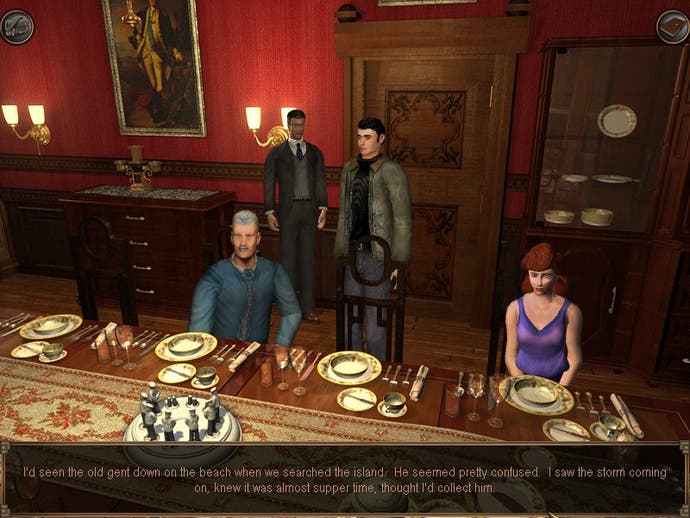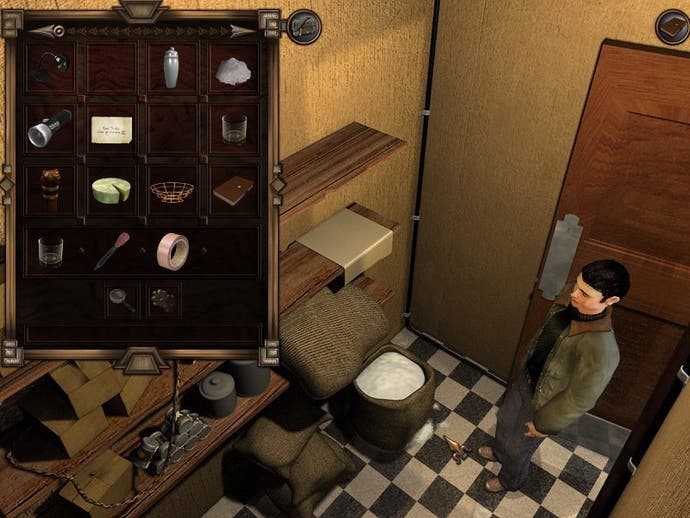Agatha Christie: And Then There Were None
Murder most foul.
Game reviewers aren't the first breed of critics to grumble about difficulty. Back in the mid 1920's book reviewers laid into Agatha Christie for creating a detective novel (The Murder of Roger Ackroyd) in which, unforeseeably, the killer turned out to be the narrator. This trick broke one of the most revered conventions of the genre and was regarded as a twist too far by many readers and commentators. Christie was unrepentant and went on to create murder-mysteries that bent the rules in even more dramatic and devious ways.
After fashioning a far-fetched 'multiple killers' plot in Murder on the Orient Express, the Grand-Dame of Crime concocted a virtually unsolvable 'multiple victims, no detective' storyline for her 1939 classic 'And Then There Were None'. That story is the basis for this unexceptional and disappointingly backward-looking point-and-click adventure.
Island records
For those that haven't read the novel or seen one of the many film versions, ATTWN is based on a deliciously intriguing premise. Eight people are invited to a house party on a small island off the Devon coast. On arriving they discover that their mysterious host, Mr. U.N. Owen, is not present but has left a macabre greeting in the form of a gramophone record. The recording accuses each of the visitors and the two house staff of an unsolved murder and sets the scene for a series of bizarre killings. Naturally there's no way off the island - the boat has been sabotaged - so the increasingly scared guests are forced to sit it out, stewing in their own paranoid juices.
While this story makes for a great book/movie it obviously posed a few problems for the game developers. With no detective involved, there's no natural avatar for the player. Awe Games have got round this fairly elegantly by having the boatman's brother, Patrick Narracott, stranded on the island along with the guests. A bigger problem less successfully dealt with is the challenge of inserting interactivity into what is essentially a sequence of scripted deaths.
Rather than examining the story and figuring out a clever new game format to fit it, Awe has resorted to all the usual adventure game clichés. To propel the plot you must solve perverse puzzles, read scattered documents, and plod through fairly tedious dialogue trees.
Deep pockets

If you've ever wondered what Miss Marple keeps in that handbag then, going on the evidence of ATTWN, it could well be a basket of apples, a bucket of water, a stepladder, and a telescope. This is one of those titles where you wander about grabbing every object, however ridiculous, that isn't nailed down. If it's collectable then you can be sure it will come in handy at some point in the future. Many of the items need to be deconstructed or combined with others before they are of any use. In an utterly bonkers addition to the Christie plot, at one point you find yourself collecting the half-dozen components required to build a... wait for it, parachute. Not all the prop-based puzzles are this ridiculous but there's enough absurdity to encourage that exasperating try-every-object-in-your-inventory-on-every-problem tactic that blights so many adventure titles.
The game is at its best when it sticks most closely to the spirit of the book and to the traditions of detective fiction. When you're peering through keyholes, overhearing snatches of conversations, or dusting for fingerprints with makeshift equipment of your own devising, you actually feel like a sleuth rather than a competitor on Scrapheap Challenge. But, considering the importance Christie placed on clever cross-questioning, it's a great pity the devs didn't put more thought into the dialogue dynamic. Instead of being a tense battle of wits in which the player attempts to force a suspect into contradicting themselves or letting slip some fact or emotion, conversations tend to be dull and mechanical. Every time someone pops their clogs you must go through the same palaver of plying the remaining guests with genius 'Do-you-have-any-theories?' questions. Poirot would be spinning in his grave.
Compared to some of the gobbledygook that passes for speeches in videogames, the dialogue in ATTWN is pretty good. Compared to the dialogue in any half-decent novel however, it's less impressive - humourless, stilted, and occasionally downright clumsy. True, it probably doesn't help that the voice talent is, with the odd exception, less than stellar, but it's hard to believe that most of the words were penned by a chap who's written top-notch TV drama and lectured on games writing at the GDC. And lip-synching the characters, who are built from polygons (albeit not that many), sadly seems to have been beyond the capabilities of the Awe team.
Interior monologue

ATTWN does manage to be quite atmospheric at times. Outside the scenery is drab and generic, but inside the storm-battered Art Deco mansion, the decor is convincing if a trifle sterile and strange (arguably, the most intriguing mystery in the game is who stole all the curtains). In a throwback to the golden age of adventure gaming, scenes are pre-rendered 2D with transition hotspots at their edges.
With several possible endings and a few optional side puzzles there's some replay potential here. Personally, I won't be revisiting the awfully named Shipwreck Island (next-door to Skull Island and Pirate Island no doubt) though. There's just not enough imagination, invention, and engagement with the source material to entice me back. If you think the game plot sounds interesting then you're really far better off reading the book or getting hold of the superb 1945 movie.
